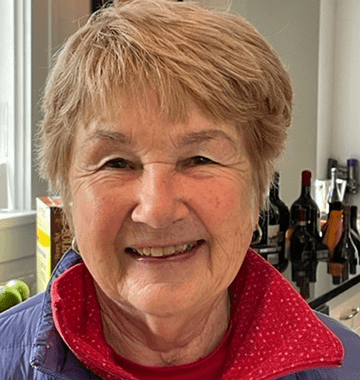Getting Stroke Care Quickly Matters
June 06, 2022
Home > About > News & Media > Story Center
Tami Mode was having a day like any other.
She had been having some on-again, off-again problems with her balance for a few weeks. Still, she felt steady while running errands one day and was just sitting down for lunch. Her husband then asked her a question. When she tried to respond the words didn’t come out as intended.
“I tried to say something back to my husband, and garbage came out,” recalls Tami. “That wasn’t good.”
Tami was no stranger to strokes. “My dad had two major strokes, and that terrified me,” she says. Even though her symptoms were different from her dad’s, she knew that she needed to get medical attention fast.
Tami’s husband drove her to the nearest urgent care clinic, where the staff immediately recognized her symptoms and quickly transferred her to Legacy Emanuel Medical Center’s emergency department for a full workup. Upon arrival, the Code Stroke team assembled and got right to work. That’s when Tami met Dr. Sierra Ford, a neurohospitalist and stroke medical director. Because Tami had gotten to the hospital so quickly, Dr. Ford knew that she was a candidate for tenecteplase, a clot-busting drug used to treat acute ischemic strokes in certain patients.
“She was scared and confused with what was happening,” says Dr. Ford. “She had disabling symptoms with her speech, difficulty thinking of words and understanding the words being said. Although her arms and legs were fine, she wouldn’t have been able to do her daily activities with these symptoms.”

Dr. Ford discussed the treatment options with Tami. With her husband’s support, Tami decided to proceed with tenecteplase, which is given intravenously.
“Once they gave me that shot, I swear within 15 minutes everything was clearing up,” she says. “That drug was a miracle for me.”
After the treatment, Tami spent the night in the neuro trauma ICU. The team monitored her closely for neurological symptoms. By the time she was discharged home the next day, her symptoms had resolved.
Tami’s story underlines the importance of understanding stroke symptoms and seeking immediate medical attention. The acronym “BE FAST” is an easy way to remember the common signs and symptoms of stroke. Because of “BE FAST,” Tami knew that the sooner she got help, the better off she was likely to be.
But Tami wasn’t the only one who acted quickly. The EMS team was also concerned about a possible stroke, so they called ahead to let the Legacy Emanuel emergency department know that they were coming. As a certified comprehensive stroke center, Legacy Emanuel is ideally equipped to care for patients with a stroke.
“The ED and neurology teams immediately assessed her, took her straight to imaging and were ready to give treatment,” says Dr. Ford. “We focused on the patient and getting the best care for her.”
During a stroke, brain tissue can be lost with each passing minute, so timing is critical. Tami received tenecteplase just 27 minutes after arriving at Legacy Emanuel. Even when patients suspect they might be having a stroke, they wait too long before coming to the hospital. Certain treatments for stroke, like tenecteplase, can only be given within a specific window of time after the stroke has started.
“Stroke is a brain emergency,” says Dr. Ford. “It comes out of nowhere. It doesn’t hurt, but it can be devastating. If you’re concerned, call 911.”
Tami is continuing her recovery at home. “I still have some brain glitches,” she says. But because of the care she received at Legacy Emanuel, she is able to tell her story, something that might not have been possible if she hadn’t acted quickly. Tami knows firsthand that things could have turned out very differently had she hesitated. “The ambulance people were fantastic, the nurses were fantastic,” she says. “We will always be grateful.”
Tami’s story underlines the importance of understanding stroke symptoms and seeking immediate medical attention. The acronym “BE FAST” is an easy way to remember the common signs and symptoms of stroke. Because of “BE FAST,” Tami knew that the sooner she got help, the better off she was likely to be.


